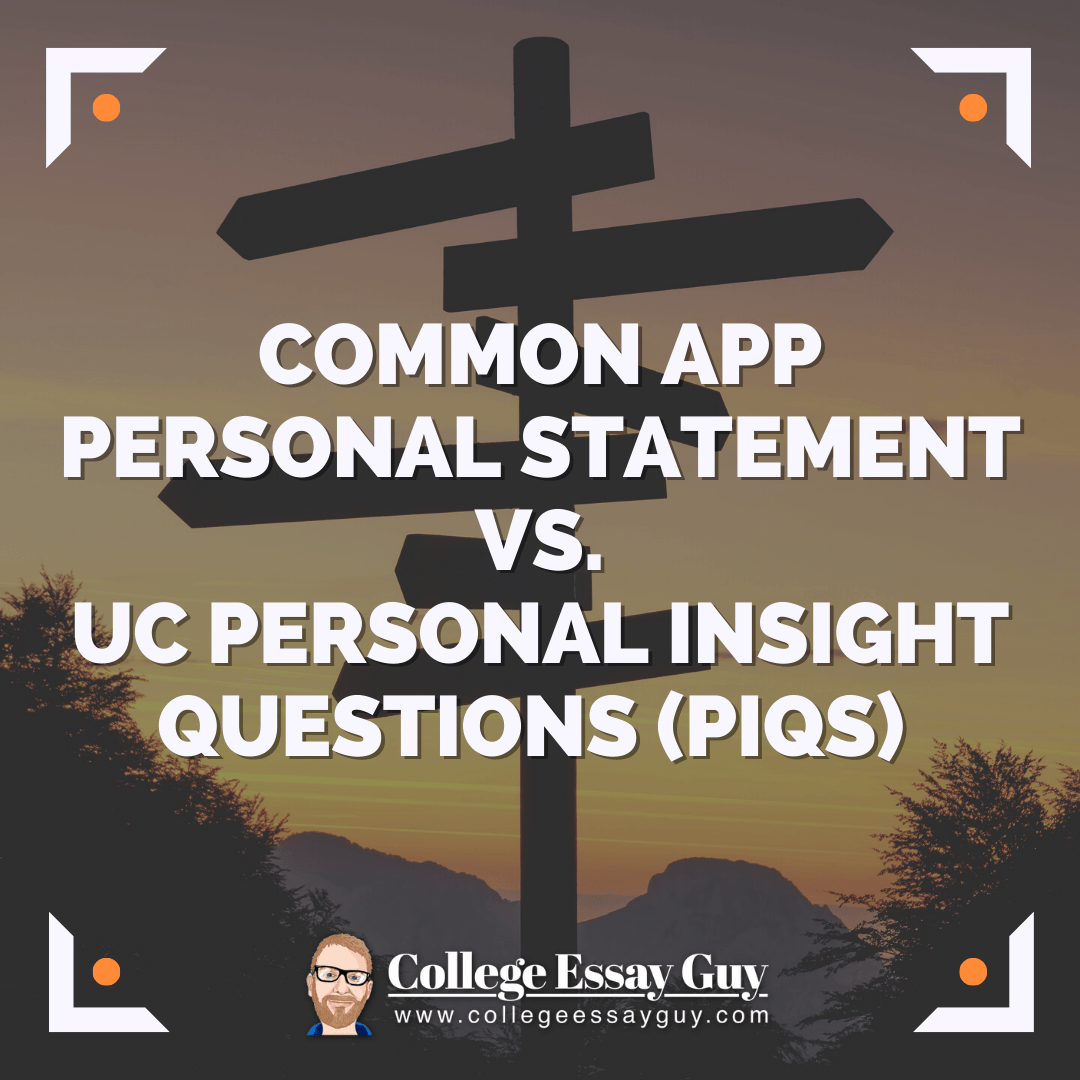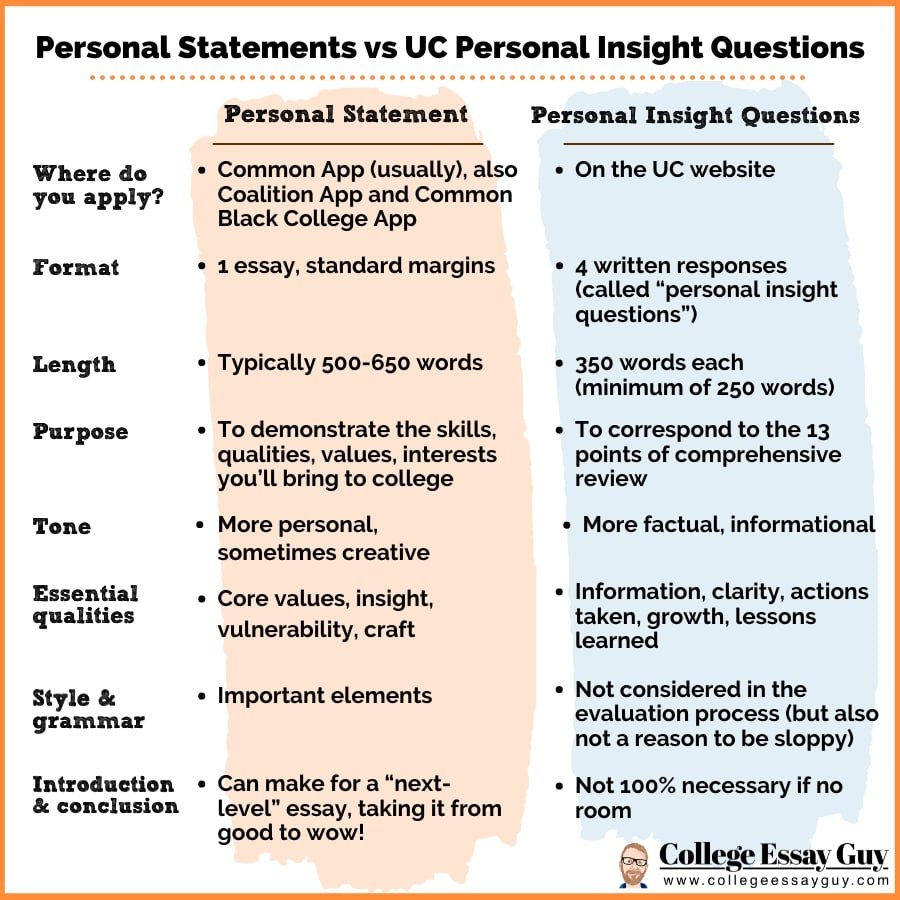Applying to colleges via the Common Application and the University of California application? Wondering if you can just copy and paste your responses from one app to another, and be done with it? The short answer: We wouldn’t recommend it.
Why? The UCs are looking for some very specific things—in short, they want information that relates to the 13 points of comprehensive review.
But the differences between the UC Personal Insight Questions and Common Application personal statement don’t end there.
Here’s our quick guide to the differences between the personal statement and the UC Personal Insight Questions. You’ve got this!
Personal Statements vs. UC Personal Insight Questions
Essential Qualities of a Personal Statement vs. UC Personal Insight Questions
We think a strong personal statement demonstrates Values, Insight, Vulnerability, and Craft, perhaps in descending order of importance.
Core Values (aka Information). Can you name at least 4-5 of the author’s core values? Do you detect a variety of values, or do the values repeat?
Vulnerability. Does the essay sound like it’s mostly analytical or like it’s coming from a deeper, more vulnerable place? Another way of asking this: Does it sound like the author wrote it using mostly his or her head (intellect) or his or her heart and gut? After reading the essay, do you know more about the author AND feel closer to him or her?
“So what” moments (aka Important & interesting connections). Can you identify at least 3-5 “so what” moments of insight in the essay? Are these moments kind of predictable, or are they truly illuminating?
Craft. Do the ideas in the essay connect in a way that is logical, but not too obvious (aka boring)? Can you tell that the essay represents a series of carefully considered choices and that the author spent a lot of time revising the essay over the course of several drafts? Is it interesting and succinct throughout? If not, where do you lose interest? Where could words be cut or which part isn’t revealing as much as it could be?
A strong Personal Insight Question, on the other hand, offers Information, Clarity, Action, Values, and (maybe) Insight (again, in roughly descending order of importance).
Information. Does your PIQ provide information that adds to your application? And does the information you provide connect back to one of the UC 13 points of comprehensive review?
Clarity. Is your topic clear, hopefully at/near the start of your PIQ? And is the purpose of each paragraph clear?
Action. Do you use active verbs to describe specifically what you’ve done—either to explore the activity you’re describing, or to overcome a particular challenge?
Values. Can we understand your core values? In fact, can we highlight and name those values based on the specific details and examples you’ve provided?
Insight. Do you answer “so what” several times in your PIQ? Do we get a sense of why the details you’ve shared are important in general, or meaningful to you in particular?
Differences in Purpose
With the above in mind, and as mentioned elsewhere, one of the primary goals of a personal statement is to demonstrate who a student is through the values, interests, qualities, and skills they’ll bring to a college.
The goal of a UC PIQ, on the other hand, is to provide what they’ve referred to as “contextualizing information” — what have you as a student done with the opportunities or in light of the obstacles you’ve encountered? Do you demonstrate a capacity to contribute to intellectual life on a UC campus?
To that end, one of the most important aspects of the UC application is the 13 points of comprehensive review. (Note that each UC campus applies these factors differently from the others, and differences are described in the link above.)
The 13 points of comprehensive review are
Grade-point average
Performance in and number of courses beyond minimum a-g requirements
UC-approved honors courses and advanced courses
Eligibility in the Local Context (ELC) – CA residents only
Quality of senior-year program of study
Academic opportunities in California high schools
Outstanding performance in one or more academic subject areas
For Engineering at Berkeley, Math/Science is important (Prompt #6)
Achievements in special projects
Improvement in academic performance
Special talents, achievements and awards
Participation in educational preparation programs
Academic accomplishment in light of life experiences
Geographic location
The ones crossed out are likely to be elements covered elsewhere in a student’s application—in other words, probably not in the PIQs. Those bolded are the ones a student likely needs to address within the PIQs. As a student, ask yourself: Am I checking most of these boxes? Better still, how could I be checking more of these boxes using my PIQs? (Example: Could I perhaps write about an academic subject, if I haven’t already?)
Differences in Tone/Approach
In many of the personal statements on the CEG website, you’ll see a poetic tone.
But the tone/approach to a PIQ is fairly different from those that many personal statements take. For PIQs, the tone is far more straightforward—and that’s totally okay. In fact, the UC readers in most cases prefer it!
One way we like to put it: On the spectrum from poetry to information, the UC PIQs are pretty far toward the information end.
A Small Note on Language
Note that the UCs have directly stated that they don’t call these essays intentionally, and discourage others from doing so. That difference hopefully helps to reinforce some of the above distinctions.
Want more help?
Check out my pay-what-you-can course—free to anyone who wants it.
Are you a counselor wanting to share this course with your students?
Send them to this page, or contact us and we’ll strategize together.










